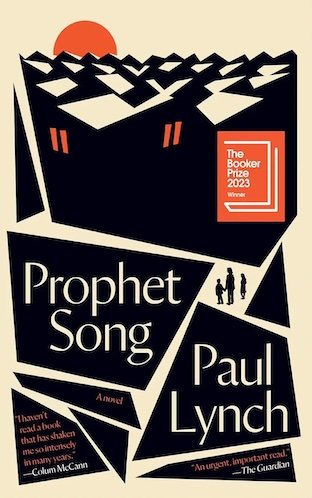Voice and Empathy in Prophet Song by Paul Lynch
Paul Lynch thought his novel would never be published. He thought the book would destroy his career. It won the 2023 Booker. He also sees it as a personal rather than a political book. Well, okay.
Prophet Song is the story of Eilish, a biologist and mother of four whose life in a suburb of Dublin is upended by the secret police showing up at her home looking for her husband Larry, who is a teacher’s union leader. Larry disappears and never returns. The backdrop is a country sliding into totalitarianism and civil war, a setting that feels uneasily like the present time in the United States.
The beauty of this book lies in how its story unfolds in the small frame of one woman’s experience, told by a narrator who is at once painfully close to her and yet aware of dangers she cannot sense. Look at this opening:
The night has come and she has not heard the knocking, standing at the window looking out onto the garden. How the dark gathers without sound the cherry trees. It gathers the last of the leaves and the leaves do not resist the dark except the dark in whisper. Tired now, the day almost behind her, all that still has to be done before bed and the children settled in the living room, this feeling of rest for a moment by the glass. Watching the darkening garden and the wish to be at one with this darkness, to step outside and lie down with it, to lie with the fallen leaves and let the night pass over, to wake then with the dawn and rise renewed with the morning come. But the knocking. She hears it pass into thought, the sharp insistent rapping, each knock possessed so fully of the knocker she begins to frown.
The glancingly punctuated passage takes breath and resistance away from me, hauls me into the story whether I wish to go there or not—I’m betting some of you feel that way about the daily news, but that won’t be because the daily news is beautifully crafted.
A few pages later, Larry says: Officers, surely you’re having me on.
Only they’re not.
Eilish’s world crumbles in ways that are similar to daily crumblings the news cycle chronicles from south of the Canada-US border—the disappearing of people, the presence of masked law enforcement personnel in the streets, the militarization of the relationship between a government and its people, the casting of political opposition as unpatriotic. All the time, Eilish is dealing with her father’s erratic stumbling into dementia, her sister in Canada urging her to leave Ireland, her children with their immediate needs and their own rebellions large and small. Admittedly, I found myself merging fictional context with my real-world preoccupations, which may not be entirely fair to the writer’s intention.
But does that intention really matter? I found so much in here that gave me perspective on the questions that come flying out of our daily reality, and these days, I’ll take perspective where I can find it. When Eilish asks the solicitor, Michael Given, “[W]hy are they being allowed to do what they like? Why has nobody shouted, stop?” it's almost as if I’m hearing myself speak. The intimacy of the narrative voice is almost suffocating in places and yet it feels expansive, its boundaries drawn to pull the reader into this near-future world that so weirdly parallels reality on a different continent. Isn’t this why fiction exists, to create spaces for empathy?
The state is supposed to leave you alone, Michael, not enter your house like an ogre, take a father into its fist and gobble him, how can I even begin to explain this to the kids, that the state they live in has become a monster?
One of the epigraphs of the book is a little marvel, “Motto” from Bertolt Brecht’s Later Svendborg Poems and Satires:
In the dark times
will there also be singing?
Yes, there will also be singing.
About the dark times.
I’m grateful to Paul Lynch for planting a kind of narrative tune in my mind. He certainly uses words like little Brechtian artistic hammers. Examples:
Chapter 3: The children won’t go to bed until she shouts them into their rooms.
Chapter 5: The noise blooms into sleep, upward and adrift through two worlds hearing footsteps sound on gravel, a laugh beneath the bedroom window as though a shadow had been let fly from dream.
Chapter 6: Oh, so you are the teacher he laughed at. Unfortunately, yes. So why does he laugh at you? I want you to understand, Mrs. Stack, that his laughter was inappropriate and goes – Yes, yes, I know, but I have to ask, were you a teacher for long, Miss Nolan, before the party put you in charge of the school? I don't see what this has to do with anything. If my son was laughing loud then I'm sure he saw something to laugh at, as though that were a crime…
Chapter 7: The birds will always inhabit the earth, the birds calling the dawn in the rent and ruined trees as she cycles across the city.
Chapter 9: … she picks up the phone and it is not memory that dials but a pattern stored in her fingers.
Through opening Eilish’s fictional world and forcing her to step out of it, Prophet Song suggests we can imagine worlds beyond our own dark times. By making her a mother doing her impossible best to save her children—and sometimes failing—Prophet Song speaks to our vulnerability as well as to the absolutions hidden in daily life. You face the next step that needs to be taken and then the next, until you reach a shore you never intended to travel towards, but there you are and now you can glimpse a different horizon.
